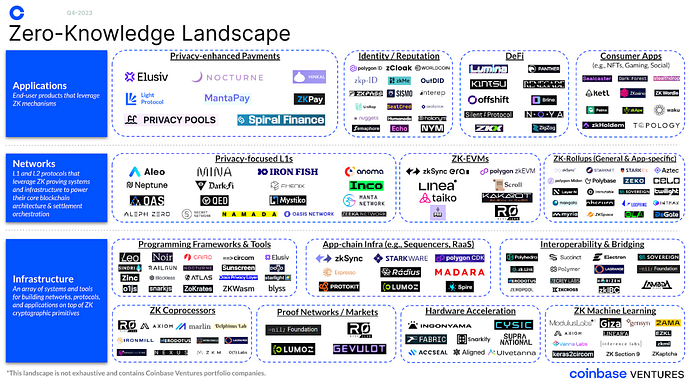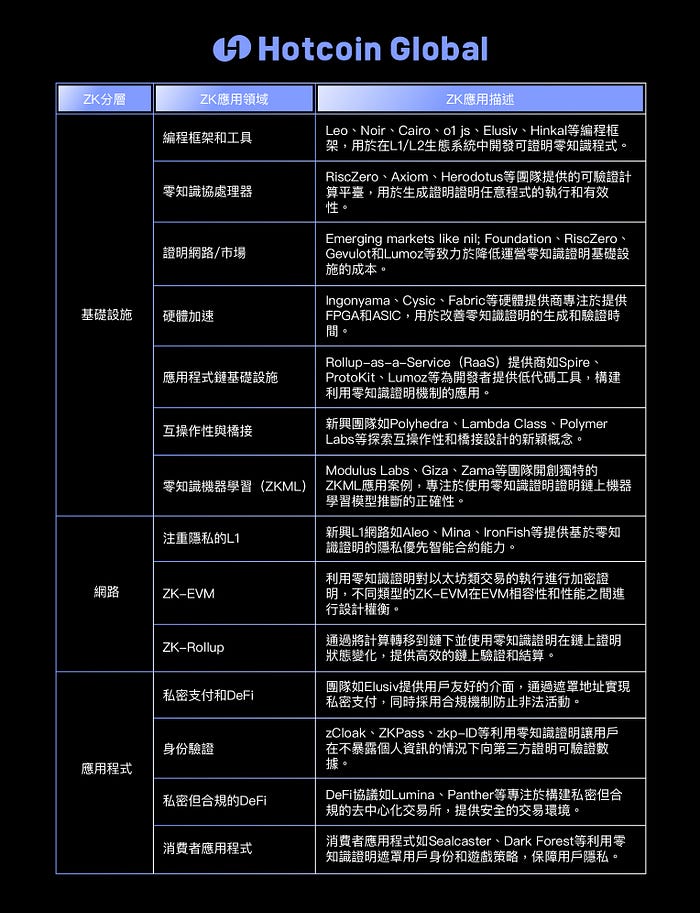Zero-Knowledge Proof (ZKP) technology has made a huge breakthrough in the field of cryptography and is widely regarded as the ultimate goal of blockchain design, with advantages such as security, efficiency, and privacy. It can solve key issues in the blockchain field such as scalability, privacy protection, and interoperability. In recent years, ZKP technology has been widely applied and developed in the blockchain field, leading to the emergence of innovative projects and platforms, demonstrating tremendous potential and value.
I. Understanding Zero-Knowledge Proof
Zero-Knowledge Proof technology was first proposed by Goldwasser, Micali, and Rackoff in 1985. It is a cryptographic technology that allows one party (the prover) to prove to another party (the verifier) that a certain statement is true without revealing any other information. For example, the prover can prove to the verifier that they know a certain password without disclosing the actual password. Zero-Knowledge Proof technology has the following three characteristics:
Completeness: If the statement is true, the prover can always convince the verifier.
Zero-Knowledge: If the statement is true, the verifier cannot obtain any additional information other than the fact that the statement is true.
Soundness: If the statement is false, the prover cannot convince the verifier.
II. Functions of Zero-Knowledge Proof
The advantage of Zero-Knowledge Proof technology is that it can improve the scalability and interoperability of blockchain networks without sacrificing security and privacy. Specifically, Zero-Knowledge Proof technology can achieve the following functions:
Verifiable Computation: The prover can prove to the verifier that they have correctly executed a complex computation without requiring the verifier to repeat the computation or provide input and output. This can shift the computational burden of the blockchain network off-chain, thereby improving the scalability and efficiency of the blockchain network.
Privacy-Preserving: The prover can prove to the verifier that they satisfy certain conditions without revealing specific conditions or evidence. For example, the prover can prove to the verifier that they have sufficient funds without disclosing their account balance or transaction history. This can protect the identity and data privacy of users on the blockchain network while achieving compliance and auditability.
Interoperability: The prover can prove to the verifier their status or behavior on another blockchain network without relying on trusted intermediaries or bridges. This can enable data and value interoperability between different blockchain networks, enhancing diversity and collaboration in the blockchain network.
III. Applications of Zero-Knowledge Proof
The Zero-Knowledge field can be divided into three layers: infrastructure, networks, and applications.
Infrastructure: This includes tools and hardware for building protocols/applications, such as programming frameworks, Zero-Knowledge coprocessors, proof networks/markets, and hardware accelerators. These infrastructures provide developers with tools and platforms to build ZKP applications.
Networks: Involves the use of Zero-Knowledge Proof systems in L1/L2 protocols, including privacy-focused L1 networks, ZK-EVM, and ZK-Rollup, aiming to address blockchain scalability and privacy issues.
Applications: End-user products utilizing Zero-Knowledge mechanisms, including private payments, identity verification, private DeFi, and consumer applications, masking user privacy and providing secure on-chain interactions.
According to data from Messari, investment in the Zero-Knowledge Proof field exceeded $400 million in 2023, mainly focused on Ethereum L1/L2 protocol scalability, emerging infrastructure, and developer tools. This demonstrates investors' optimistic outlook on ZKP technology and provides financial support for ecosystem development.

Image Source: https://www.odaily.news/post/5192444
ZK Infrastructure Layer
Programming frameworks and tools: Practical applications of Zero-Knowledge Proof require the use of arithmetic circuit language. Recent frameworks such as Leo, Noir, Cairo, and o1 js provide support for developers to develop provable Zero-Knowledge programs in the L1/L2 ecosystem. General frameworks like Elusiv and Hinkal are also emerging and are expected to be more widely adopted as demand grows.
Zero-Knowledge coprocessors: These coprocessors provide developers with trustless off-chain computing capabilities. Teams such as RiscZero, Axiom, and Herodotus provide platforms for verifiable computation, used to generate proofs of the execution and validity of arbitrary programs. These coprocessors are expected to become advanced components of on-chain applications.
Proof networks/markets: While most Zero-Knowledge networks and protocols currently rely on centralized proof processes, with the growth of Zero-Knowledge adoption, teams may seek decentralized proof layers to increase activity and censorship resistance. Emerging markets like nil; Foundation, RiscZero, Gevulot, and Lumoz aim to reduce the cost of operating Zero-Knowledge proof infrastructure.
Hardware accelerators: The application of dedicated hardware (such as FPGA and ASIC) is expected to improve the generation and verification time of Zero-Knowledge proofs. Hardware providers such as Ingonyama, Cysic, and Fabric are leading in providing FPGA and ASIC, with more innovation and investment expected in the future.
Application chain infrastructure: Rollup-as-a-Service (RaaS) providers such as Spire, ProtoKit, and Lumoz offer low-code tools for developers to build, test, and deploy applications using Zero-Knowledge Proof mechanisms. Sorters such as Espresso, Radius, and Madara provide infrastructure to accept user transactions and perform verification and settlement on-chain. The next generation of Ethereum scalability may be driven by modular L2 rollup stacks, creating demand for these providers.
Interoperability and bridging: Zero-Knowledge Proof is expected to help replace trusted systems, promoting more secure and robust cross-chain communication. Emerging teams such as Polyhedra, Lambda Class, and Polymer Labs are exploring novel concepts in interoperability and bridging design.
Zero-Knowledge Machine Learning (ZKML): ZKML focuses on using Zero-Knowledge Proof to prove the correctness of on-chain machine learning model inferences. Teams such as Modulus Labs, Giza, and Zama are pioneering unique ZKML application cases, providing a collaborative balance at the intersection of AI and encryption technology.
ZK Network Layer
Privacy L1: Emerging L1 networks such as Aleo, Mina, and IronFish provide privacy-first smart contract capabilities based on Zero-Knowledge Proof, offering application-level privacy for decentralized applications in the ecosystem. These networks require time for incentive testing but are expected to achieve widespread adoption and value capture in 1-2 years.
ZK-EVM: ZK-EVM uses Zero-Knowledge Proof to cryptographically prove the execution of Ethereum-like transactions, designed to balance EVM compatibility and performance. ZK-EVM is expected to continue innovating in the future, providing more choices for Ethereum and Ethereum-based ZK rollups.
ZK-Rollup: ZK-rollup is an L2 scaling solution that shifts computation off-chain and uses Zero-Knowledge Proof to prove state changes on-chain, providing efficient on-chain verification and settlement. While optimistic rollup currently holds 90% of the L2 market share, demand for ZK-rollup is expected to increase with advancements in underlying technology.
ZK Application Layer
Private payments and DeFi: Teams such as Elusiv provide user-friendly interfaces for private payments using address masking, while adopting compliance mechanisms to prevent illegal activities.
Identity verification: zCloak, ZKPass, and zkp-ID use Zero-Knowledge Proof to allow users to prove verifiable data to third parties without exposing personal information.
Private but compliant DeFi: DeFi protocols such as Lumina and Panther focus on building private but compliant decentralized exchanges, providing a secure trading environment.
Consumer applications: Consumer applications such as Sealcaster and Dark Forest use Zero-Knowledge Proof to mask user identities and game strategies, ensuring user privacy.

IV. Prospects for the ZK Race
The future of the Zero-Knowledge (ZK) field presents several key directions, including optimizing speed, reducing hardware requirements, improving development tools, and supporting new proof designs that enable decentralized proof generation.
Technical integration: With the application of optimistic rollup and Zero-Knowledge scaling solutions in verifying rollup transactions, there are design trade-offs in security, latency, and computational efficiency. It is expected that in the medium to long term, these two technology stacks will tend to integrate to better adapt to the diverse needs of on-chain applications.
Performance optimization: The ZK field will focus on improving transaction processing speed and reducing hardware resource requirements. The next generation of Zero-Knowledge Proof designs will prioritize performance optimization to provide users with a faster and more efficient transaction experience.
Improvement of development tools: With the widespread adoption of ZK technology, the improvement of development tools will be crucial. More flexible and efficient development tools will help developers build more diverse and complex ZKP applications.
Privacy application growth: With the increasing demand from end-users for privacy protection on public blockchains, the application layer of ZK will experience significant growth. Projects such as zCloak, Elusiv, and others provide features such as private payments and identity verification, emphasizing the growing user concern for privacy.
Ecosystem adaptability: While Zero-Knowledge research is currently mainly focused on the Ethereum ecosystem, emerging concepts such as Solana's Token 22 project and confidential transfers indicate that ZK has adaptability and potential beyond specific ecosystems.
Overall, the transformative potential of Zero-Knowledge Proof is rapidly unfolding, bringing significant improvements in security, privacy, and scalability to blockchain solutions, and continuing to lead innovation and investment trends in the future.
Hotcoin Community
Official Chinese Group: https://t.me/hotcoinglobalcn
Official English Group: https://t.me/HotcoinEX
Official Korean Group: https://t.me/hotcoinkorea
Discord: https://discord.gg/NwYqKWkcZn
Facebook: https://www.facebook.com/HotcoinExchange
Twitter: https://twitter.com/HotcoinGlobal
Hotcoin Official Website: https://www.hotcoin.com
免责声明:本文章仅代表作者个人观点,不代表本平台的立场和观点。本文章仅供信息分享,不构成对任何人的任何投资建议。用户与作者之间的任何争议,与本平台无关。如网页中刊载的文章或图片涉及侵权,请提供相关的权利证明和身份证明发送邮件到support@aicoin.com,本平台相关工作人员将会进行核查。




